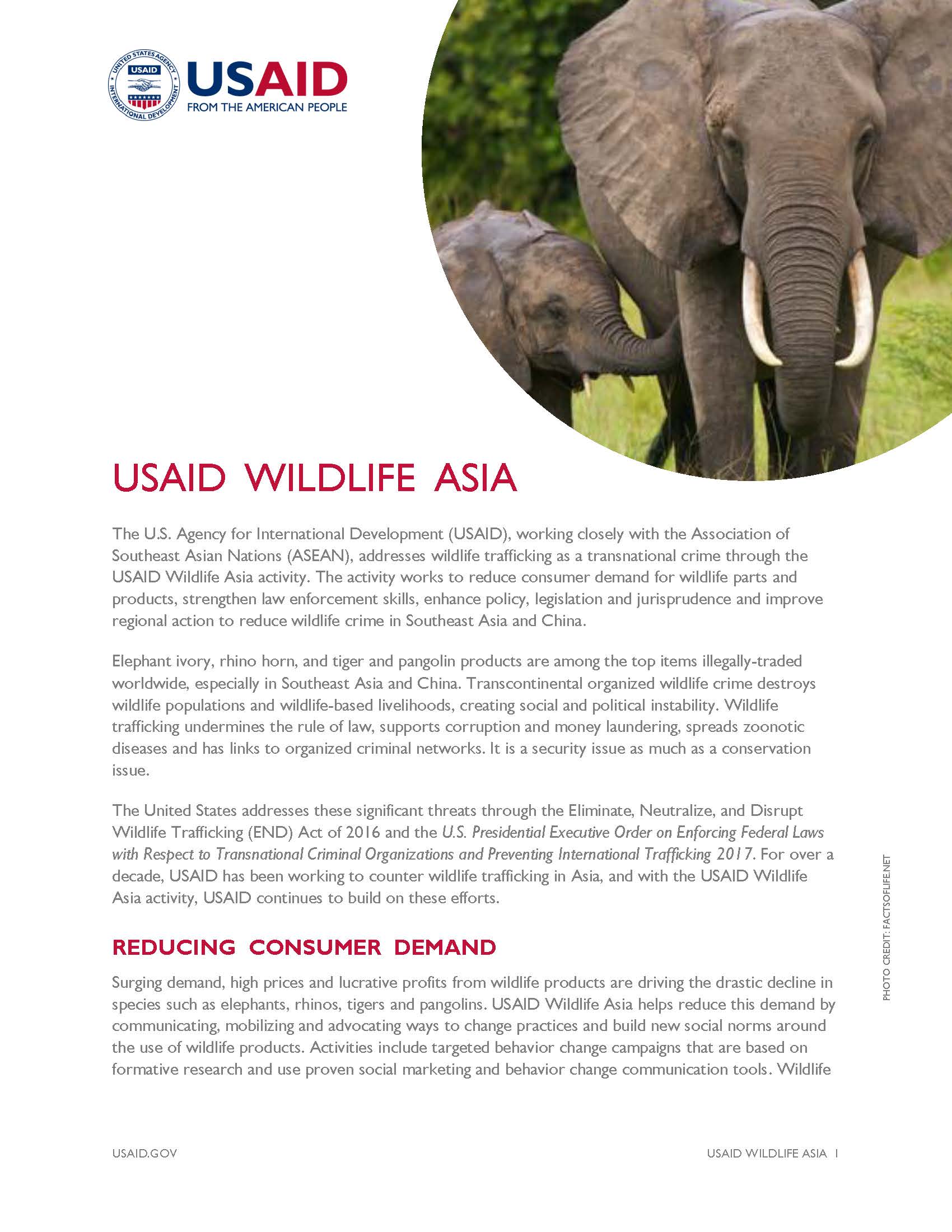The U.S. Agency for International Development (USAID), working closely with the Association of Southeast Asian Nations (ASEAN), addresses wildlife trafficking as a transnational crime through the USAID Wildlife Asia activity. The activity works to reduce consumer demand for wildlife parts and products, strengthen law enforcement skills, enhance policy, legislation and jurisprudence and improve regional action to reduce wildlife crime in Southeast Asia and China.
Elephant ivory, rhino horn, and tiger and pangolin products are among the top items illegally-traded worldwide, especially in Southeast Asia and China. Transcontinental organized wildlife crime destroys wildlife populations and wildlife-based livelihoods, creating social and political instability. Wildlife trafficking undermines the rule of law, supports corruption and money laundering, spreads zoonotic diseases and has links to organized criminal networks. It is a security issue as much as a conservation issue.
The United States addresses these significant threats through the Eliminate, Neutralize, and Disrupt Wildlife Trafficking (END) Act of 2016 and the U.S. Presidential Executive Order on Enforcing Federal Laws with Respect to Transnational Criminal Organizations and Preventing International Trafficking 2017. For over a decade, USAID has been working to counter wildlife trafficking in Asia, and with the USAID Wildlife Asia activity, USAID continues to build on these efforts.
REDUCING CONSUMER DEMAND
Surging demand, high prices and lucrative profits from wildlife products are driving the drastic decline in species such as elephants, rhinos, tigers and pangolins. USAID Wildlife Asia helps reduce this demand by communicating, mobilizing and advocating ways to change practices and build new social norms around the use of wildlife products. Activities include targeted behavior change campaigns that are based on formative research and use proven social marketing and behavior change communication tools. Wildlife champions, business leaders, women and youth help amplify demand reduction messaging campaigns in China, Thailand and Vietnam.
STRENGTHENING REGIONAL LAW ENFORCEMENT
USAID Wildlife Asia strengthens regional police, customs and prosecutors’ ability to effectively locate, apprehend and prosecute illegal wildlife traffickers through training. Working with Interpol, the ASEAN National Police and the ASEAN Working Group on the Convention on International Trade in Endangered Species and Wildlife Enforcement, USAID Wildlife Asia supports law enforcement collaboration in the region and brings together enforcement authorities in Asia and Africa to share intelligence on active investigations and collaborate in dismantling transcontinental trafficking syndicates. Law enforcement efforts are further supported through introduction of new technologies, including wildlife forensics and smart phone applications.
ENHANCING POLITICAL COMMITMENT AND SUPPORT
USAID Wildlife Asia activities engage decisionmakers and promote countries’ commitment to end wildlife crime. The Supreme Court of Thailand is the key Thai government counterpart for USAID Wildlife Asia, and activities strengthen the Green Benches program, improving court rules of procedures and introducing sentencing guidelines for wildlife crimes. USAID Wildlife Asia is supported by the U.S. International Conservation Caucus Foundation and the Asia Pacific Centre for Environmental Law and engages with the ASEAN Inter-Parliamentary Assembly, the Parliamentary Institute of Cambodia and champion parliamentarians in Cambodia, Lao People’s Democratic Republic, Thailand and Vietnam to improve respective legal and policy frameworks, to share legal and policy innovations and good practices and to harmonize penalties for wildlife crimes.
SUPPORTING REGIONAL COOPERATION
The END Act of 2016 encourages regional cooperation among external stakeholders as well as U.S. government agencies involved in counter wildlife trafficking. USAID Wildlife Asia collects, synthesizes and shares information on counter wildlife trafficking efforts with U.S. agencies in the region, providing a knowledge management hub. USAID Wildlife Asia supports END Act focus countries, U.S. Inter-Agency Counter Wildlife Trafficking Strategies and convenes external counter wildlife trafficking stakeholders from across the region to participate in major events, such as the March 2017 Innovations in Counter Wildlife Trafficking Conference.
PARTNERS
The activity is implemented by International Resources Group (IRG), a subsidiary of RTI, in partnership with FHI 360, International Fund for Animal Welfare, Freeland and Integra, all of which lend particular expertise in targeting the illicit trade in wildlife and wildlife products.








Comment
Make a general inquiry or suggest an improvement.